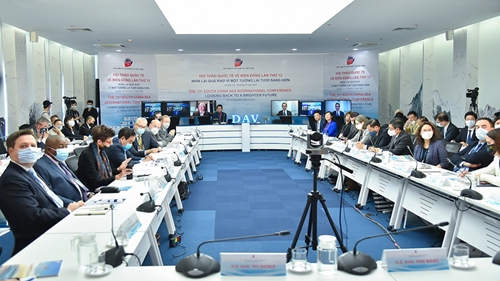The conference saw the in-person participation of more than 800 delegates and virtual attendance of over 400 others.
In his speech, Dr. Pham Lan Dung, acting Director of the Diplomatic Academy of Vietnam (DAV), emphasized that nations have increasingly heightened the role and value of the establishment of legal frameworks for activities at sea and ocean to meet the common interest of the international community and littoral nations.
    |
 |
|
At the 13th international conference on the East Sea |
Confirming the principle of addressing international disputes in general by peaceful means based on international law, Pawel Herczynski, Director for Common Security and Defense Policy and Crisis Response at the European Union (E.U.)'s External Action Service, said that E.U. always backs the settlement of disputes in the East Sea by peaceful means, adhere to international law, including UNCLOS 1982, and by internationally-built mechanisms.
As a coordinator at the discussion session themed “Be fair to the truth: History and East Sea,” Dr. Erik Solheim, former Executive Director of the U.N. Environment Program, held that the use of international court and international law to solve East Sea issues is very important. According to him, parties concerned must exert efforts to maintain peace, cooperation for regional prosperity in the future.
Agreeing with Dr. Erik Solheim, Dr. Vu Hai Dang, a senior fellow researcher at the National University of Singapore; Dr. Bill Hayton, a leading expert of the Asia-Pacific Program at Chatham House, an independent policy institute in England; Professor Monique Chemillier-Gendreau, former President of the French Association of Democratic Lawyers added that in handling disputes in the East Sea, one of the most important elements is the need to evaluate evidences presented by the claimant states in the East Sea.
At the conference, delegates emphasized the need to build a multilateral security structure in the region, effectively deal with traditional and non-traditional security challenges with ASEAN holding the key and leading role.
Highlighting ASEAN for its five-year efforts to build processes, issue standards and regulations to ensure peace and security in the East Sea, former Indonesian Foreign Minister Marty Natalegawa hoped that the association would continue to secure its central position in addressing regional issues and its unified voice in settling East Sea issues.
Also at the event, delegates discussed East Sea situation in different aspects, from history, politics, diplomacy to law, and emphasized the urgent need to build, strengthen, and make use of regional security mechanisms in managing disputes and addressing complicated issues in the East Sea peacefully.
Translated by Mai Huong